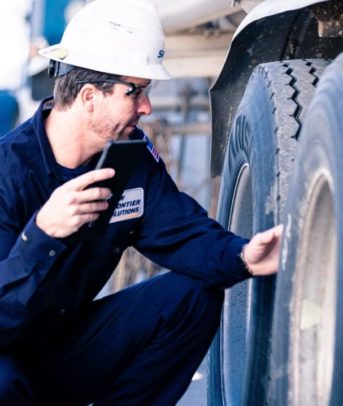Did you know there are 900 possible violations that can affect a CSA score? Whether it’s for unsafe driving or a poorly maintained vehicle, substance possession or working too many hours, what’s most critical is how many violations a driver or carrier has had, how severe they were, and how recent they were. But even though there are a lot of variables, one thing is certain: CSA scores can have dramatic effects on a business, including its ability to recruit and retain drivers.
Under the current system, the FMCSA groups and ranks drivers and carriers each month based on the number of crashes, inspections or violations they have experienced and assigns them a percentile from 0 to 100. The higher the number, the worse the performance, and the more likely the FMCSA will prioritize them for inspections and investigations.
A planned overhaul of the CSA system will tighten the focus on preventing crashes by promoting a culture of safety rather than predicting the risk of a crash. The new system will use the same seven BASICs (unsafe driving, fatigued driving, driver fitness, drugs and alcohol, vehicle maintenance, cargo-related and crash indicator), but violations will be weighted differently. Drivers and carriers who have a wide variety of violations will be penalized because that indicates an unsafe company culture.
Here are four reasons why maintaining a low CSA score in your fleet is important.
Reduced Likelihood of FMCSA Interventions
As much as the BASICs that make up the CSA scores are the FMCSA’s main tool for determining a carrier’s crash risk, they are also used by the FMCSA to single out carriers for interventions. FMCSA uses BASICs to calculate Inspection Selection System (ISS) scores, which are used to determine how often a carrier’s vehicles should be inspected.
CSA violations can also prompt the FMCSA to issue warning letters and target carriers for roadside inspections. And if safety still doesn’t improve, they can lead to even more time-consuming on-site investigations that require vehicle inspections, employee interviews and even mandatory corrective actions, fines and orders to stop all motor vehicle operations.
You’ll Save on Your Insurance Premiums
Not only do carriers who perform poorly with the seven BASICs run the risk of being investigated by the FMCSA, they may also be subject to higher insurance premiums, deductibles and possibly a denial of coverage. About a third of roadside inspections are ordered due to observable vehicle defects, such as broken and inoperable lights, as well as poor tires. Violations for those types of vehicle maintenance add up, contributing to a poor score.
How to Modernize Fleet Management
Get your free guide to improving fleet performance and profitability with in-cab mobile technology. Download Now
Many insurance companies look at carriers’ BASICs to evaluate their risk, especially if they’ve had violations for vehicle maintenance, unsafe driving, crash indicators or HOS compliance. The FMCSA correlates poor scores with higher crash risk, and insurance companies often factor that into their premiums.
Your Marketability Will Get a Boost
Potential customers often look to carriers’ CSA scores to decide which company to hire. While the FMCSA may see a poor CSA score as a safety risk, customers may see it as a signal that a carrier may not be reliable. If a carrier’s drivers are constantly being pulled over for maintenance problems or are targeted for investigations, they may not be able to make their deliveries on time. So by maintaining a good CSA score, carriers improve their ability to attract new customers and maintain the ones they already have. It proves their ability to do what they were hired to do: deliver.
You’ll Increase Your Chances of Attracting New Drivers
It isn’t only customers who judge a carrier by its CSA score. Potential drivers also look at them to decide which company to drive for. Drivers don’t want to drive unsafe vehicles or see their scores negatively affected by the companies they work for, so they are more likely to choose a fleet that makes safety and crash prevention a priority. Any edge a company can provide in attracting drivers during what is expected to be an ongoing driver shortage is an advantage.
The best way to maintain a good CSA score is to make sure that drivers are operating safely. With the CSA system being updated later this year to focus on safety culture rather than risk prediction, fleet management should encourage pretrip checks of brakes, lights and tires to avoid the most common vehicle maintenance violations.
To reduce the risk of violations for HOS compliance, and to monitor drivers for unsafe behaviors like speeding or texting, they may also want to consider installing electronic logging devices (ELDs) such as the Galaxy Tab Active Pro. After all, a fleet is only as safe as its individual drivers.
See what connected fleet solutions are available to help you meet company and driver needs.










